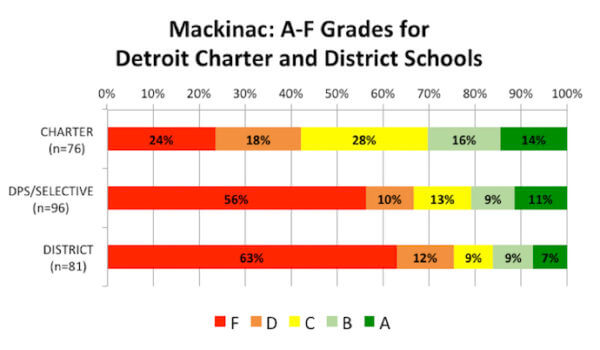Ricochet is the best place on the internet to discuss the issues of the day, either through commenting on posts or writing your own for our active and dynamic community in a fully moderated environment. In addition, the Ricochet Audio Network offers over 50 original podcasts with new episodes released every day.
 DeVos, Detroit, and a False Media Narrative
DeVos, Detroit, and a False Media Narrative
 In advance of today’s confirmation hearings for Betsy DeVos, the nominee for Secretary of Education, defenders of the status quo have been spinning a narrative about her reform efforts in Detroit that runs contrary to all available evidence.
In advance of today’s confirmation hearings for Betsy DeVos, the nominee for Secretary of Education, defenders of the status quo have been spinning a narrative about her reform efforts in Detroit that runs contrary to all available evidence.
In op-eds, editorials, and editorials veiled as news, the New York Times has pushed the narrative that in Detroit, “charter schools often perform no better than traditional schools, and sometimes worse.” However, as Max Eden and I show at Education Next today, all the available data show that charter schools in Detroit significantly outperform their traditional district counterparts.
Here’s a taste from the Mackinac Center’s report, one of the three studies of school performance in Detroit that we break down:
Once again, charter schools show a clear advantage. The percentage of charters earning an “A” is double the percentage of non-selective district schools. Nearly six in ten charters earn a grade of “C” or higher compared to only a quarter of non-selective district schools. Likewise, less than a quarter of charters earned an “F” compared to more than six in ten non-selective district schools.
If your crazy aunt or annoying coworker starts ranting about how Betsy DeVos ruined education in Michigan by supporting “failing” charter schools, now you have the data to show otherwise. For the full story (and several colorful charts), just follow this link.
Published in Education, Politics




I didn’t think people were forced to put their children in charter schools, but maybe I am wrong. Somehow there are children in these schools to study. I would think if the parents didn’t see a benefit, they would put them somewhere else. The problem is probably on the adult end (unions, jobs for adults) rather the family/child end.
Jason, many thanks for your articles on this and similar issues. I’ve seen all manner of nonsense about Mrs De Vos, and being forewarned by your informative articles has enabled me to put them in context. There are so many folks who truly think that the purpose of education expenditure is to maximize The State. Why, they say, money spent on textbooks in Public (Government) Schools means the People (the Government) owns a textbook. But money spent on textbooks in charter schools means non-Government folks might own a textbook. Heresy! How parent, children or education enters into this mode of thinking is difficult to see…
Thank you so much for highlighting a Michigan educational success story, as well as the wonderful Mackinac Center!
I suddenly realised yesterday that a good deal of the opposition to charter schools, as to selective schools here in the UK, treated the school as the end rather than the means.
The argument often runs that, if school X loses its best pupils, the school will be worse. That may very well be true in terms of average performance, but does not mean that the pupils will do any worse than they would otherwise have done. And the pupil should (presumably) be the end, the school the means.
The variant often found over here is that to remove oneself from public (in the US sense) schools is to weaken the social fabric; one is “letting the side down”. This is hypothetically appealing but practically untenable, although quite strongly held by even moderate opinion.
Fundamentally, the idea that the state obligates you to not only assure an education for your child but also to follow exactly how and what the state wishes to teach is mildly totalitarian.